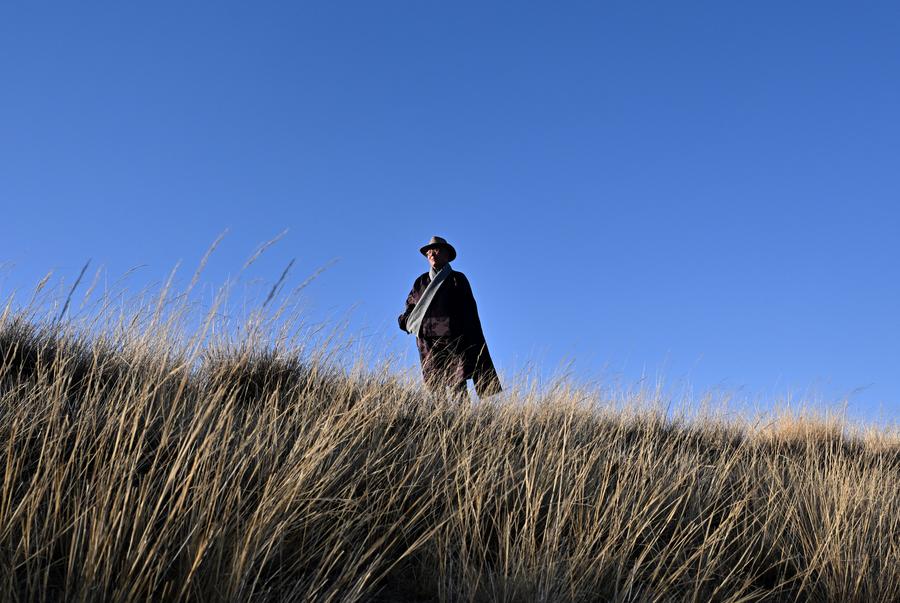
XINING — Norpal Gyal often loses himself in the beautiful sights of Qinghai Lake, like its flying water birds, rippling blue-green waves and meandering flocks of sheep, which look like pearls scattered on the grasslands.
Norpal Gyal is a herder and poet from Qinghai province. The 63-year-old lives in Yermo village in Gangca county in the Haibei Tibetan autonomous prefecture, which is located beside Qinghai Lake, the country's largest inland saltwater lake.
Every morning, he sets out with a book, a tablet computer and a camera bag slung over his shoulder. Following the gentle rhythm of the herd, he makes his way toward a winter pasture not far from home, to start a day of grazing and writing poetry by the lake, which has been dubbed a "cradle of poetry".
READ MORE: The renaissance of centuries-old Tibetan opera
"Like music and painting, poetry is a form of expression," says Norpal Gyal. "When you feel that life is difficult, read poetry. When you get bored with herding, read poetry."
He has loved reading since he was a child, especially books about philosophy and history, and says his love of reading and understanding life blossomed after reading Stray Birds, a collection of poems by Indian writer Rabindranath Tagore.
He was eventually forced to drop out of school because of illness.
"When I was stuck at home, a sense of gloom enveloped me. I would often look at the sheep on the grasslands in a daze, wanting to say something, but I was the only one in that vast space," Norpal Gyal recalls.
"That's when I thought I would chronicle the changes to each blade of grass and every dewdrop through poems."
One of those poems reads as follows: The bright flowers bloom into the sky in the summer, and the seeds in the autumn become full. The white robes sewn in the winter are taken away as gifts by the spring breeze.
Norpal Gyal not only captures observations of everyday life in his poetry but also documents the changes to his own life and hometown.
In 2010, his family of six moved into a new home. Although they no longer depend solely on herding, he holds onto this way of life, as he believes that herding is his source of inspiration for poetry.
To date, Norpal Gyal has written more than 200 poems. Last June, his third collection of verse was published by the Qinghai Ethnic Publishing House, the summation of nine years of work.
According to Gyumey Dorje, vice-chairman of the Qinghai writers' association, Norpal Gyal has been breaking through boundaries in poetry for more than 40 years, articulating his reflections on life with a blend of quiet contemplation and incisive language.
He is not alone in delving into poetry in the Qinghai Lake area. Local herders say they often chant verses to one another during breaks as their flocks graze.
ALSO READ: Focusing on wild beauty
Last June, the biennial Qinghai Lake Poetry Festival was launched in Gangca county, attracting 80 poets from China and abroad in pursuit of inspiration.
According to Medrup, vice-chairman of the Qinghai provincial federation of literary and art circles and chairman of the Qinghai writers' association, the rapid development of rural writers in Qinghai has both fostered and pooled creative energy for the production of work focused on the theme of rural vitalization in recent years.
The work of the poets encapsulates the beautiful scenes of harmonious coexistence between humanity and nature in the province, Medrup says.


